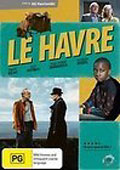
Directed by
Aki Kaurismaki
93 minutes
Rated PG
Reviewed by
Sharon Hurst

Havre, Le
Synopsis: Marcel Marx (Andre Wilms) is an aging once-artist-now-shoeshine-man who lives in the French port city of Le Havre. His life borders on poverty-stricken, and his wife, Arletty (Kati Outinen), is diagnosed with a terminal illness. When a ship arrives with a container load of illegal refugees from Africa, one young lad, Idrissa (Blondin Miguel) escapes the clutches of police inspector Monet (Jean-Pierre Daroussin) and ends up being helped by Marcel and his neighbourhood friends.
A couple of years ago the French film Welcome (2009) addressed similar issues to Le Havre – refugees being hounded by the authorities and helped out by ordinary, kind-hearted folks. Whilst that was a more earnest and with a darker denouement, Kaurismaki’s trademark style of whimsical naiveté borders at times upon the fairy-tale.
This idiosyncratic Finnish director has a knack of paring his stories to the minimum, capturing the essence of his characters, the vital points in the plot and using only those visual components that are absolutely necessary. As writer, he also has a penchant for uncovering the goodness within people, as he did memorably with Man Without A Past (2002) in which a fellow who loses his memory after a bashing transforms his life, aided by a Salvation Army woman, also played by Kati Outinen, one of the director’s favourite Finnish actresses. Similarly here Marcel acquaintances also exhibit this streak of generosity and altruism. Even the black-clad Inspector Monet conceals a sense of a higher purpose behind his official exterior.
Other impressive features of the film are the director’s striking use of music, some typically French, some more classical, with an unforgettable scene featuring the mesmerising real-life singer, Little Bob, performing to raise money to help Idrissa get to London. The use of the song “Matelot” (meaning sailor) by The Renegades is also a powerful soundtrack tool, its lyrics underscoring young Idrissa’s need (and that of all refugees) to find a place of belonging.
As is typical of the director's films the camera work by Kaurismakils regular cinematographer Timo Salminen is striking. Every scene is pared down and crisp, often using painterly tableaux or dramatic close-ups of the characters’ faces. The gentleness of the characters is delicately drawn with each actor perfectly chosen for the part. And as the title suggests the film is also a fascinating depiction of a port city where sea-roads cross and borders are blurred.
One needs to engage the film with a suspension of disbelief as the miraculous is central to its vision. Ultimately what I just adore about this film is its overriding sense of faith in humanity. I find myself loving the characters and the endearing way in which they are so simply presented. Kaurismaki portrays the best in people and by association as a viewer I feel more positive about life and the world, and imbued with a little more hope. Obviously the critics concurred as Le Havre won the top prize at the 2011 Cannes Film Festival.

Want more about this film?


Want something different?




